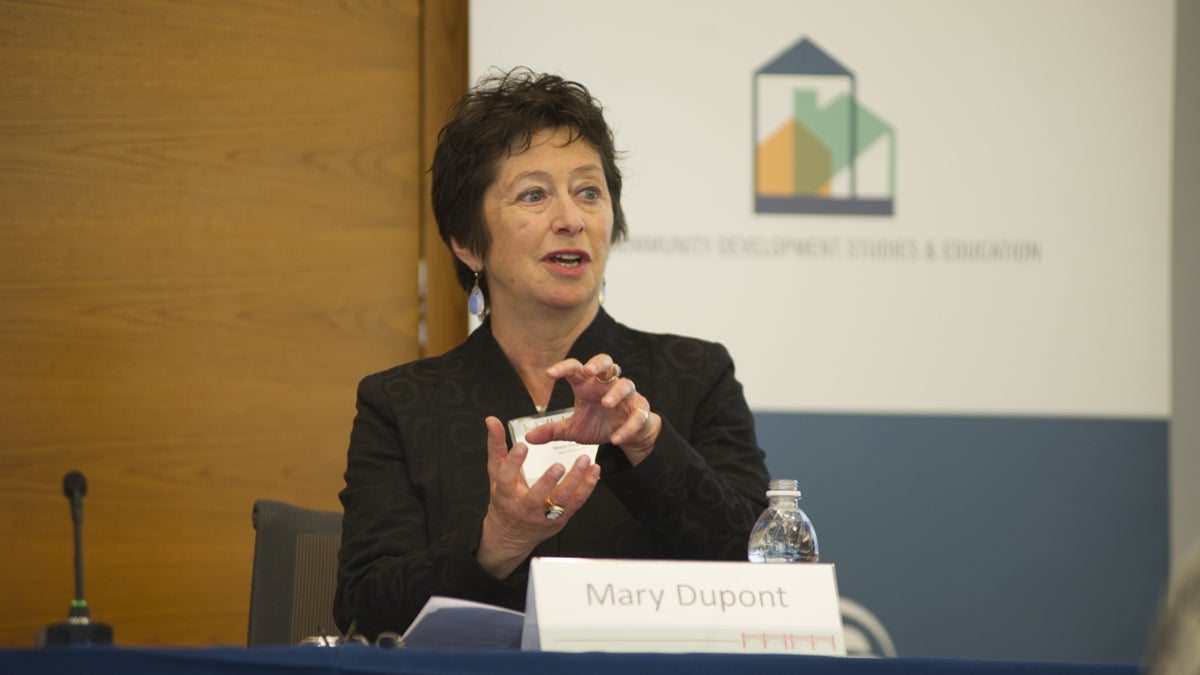Financial insecurity may be taking a toll on health

Mary Dupont is the director of financial empowerment for the State of Delaware. (Federal Reserve Bank of Philadelphia)
Philanthropists and policy makers gathered at the Federal Reserve Bank of Philadelphia Thursday to talk about the role of financial security in people’s health.
Money trouble is one of the things that stresses Americans most, according to a 2015 study from the American Psychological Association.
“Not only is money one of the highest stressors among Americans but people use coping mechanisms — like eating unhealthy and drinking alcohol and smoking — to deal with the types of stress that lead to chronic diseases like diabetes and heart disease,” said Sara Solomon from the Center for Public Health Initiatives at the University of Pennsylvania.
In Delaware a financial empowerment partnership is teaching people how to negotiate with creditors and improve their credit score.
“An easy item, for example, could be that old $56 Verizon bill. You forgot about it. You moved on, you canceled that account. That thing is hanging out there and it’s pulling your credit score down,” said Mary Dupont who leads the $tand by Me program.
“Your personal pocketbook may dictate decisions that you make like how you get to work. Do you take public transportation or could you add a walk into your day that could really save you a token, but also give you a few extra steps?” said Rosemary Frasso from the Penn center.
The public health experts in the crowd said both the “ecosystem” that people live in and their individual choices shape physical and financial health.
Frasso said changes in personal spending habits can’t happen if people are worried about whether their children have a safe place to play.
“People can only handle the biggest issue in their lives and often that’s around safety in the city of Philadelphia,” Frasso said.
Many people at the event talked about the lasting psychological impact of the Great Recession — a feeling that you can’t overcome your financial situation.
“Whole communities started to feel that way,” said Daria Sheehan from Citi Foundation, which funds wealth-building programs.
Her foundation used to be more focused on “hard,” tangible outcomes — such as improvements in people’s credit scores or a bigger nest egg — to understand if Citi’s investment was paying off.
Community partners have told Sheehan it’s also important to understand if people feel less stressed after coaching, or if they are more confident about achieving financial goals.
Health researchers are building the case that financial insecurity directly influences health. For example, investigators at Johns Hopkins University are studying whether having food stamps helps keep low-income older adults out of the hospital.
“Let me be clear, I don’t think we should be asking doctors to become bankers, or asking nurses to become financial coaches,” said Kate Griffin from the Corporation for Enterprise Development.
But, she said, publicly funded health centers could be a great place to connect with people and teach them money skills.
Griffin said her ideas have evolved about what financial skills are essential.
“It’s not whether your kindergartner can tell the difference between a quarter and a nickel. It’s making sure your kindergartner has executive function,” Griffin said.
Parents want their kids to learn to delay gratification and to set and work toward financial goals.
A new wave of data collection is helping experts connect financial security to other parts of people’s lives, said Rachel Schneider from the Center for Financial Services Innovation.
WHYY is your source for fact-based, in-depth journalism and information. As a nonprofit organization, we rely on financial support from readers like you. Please give today.

